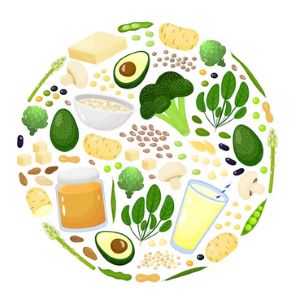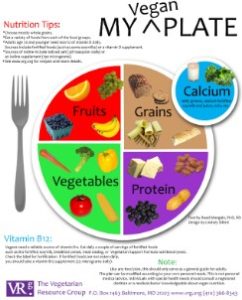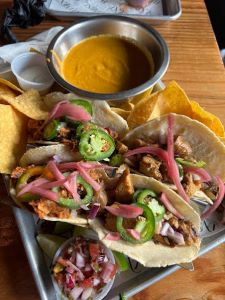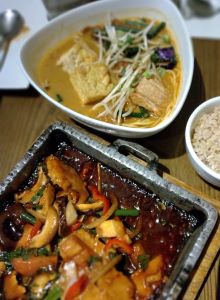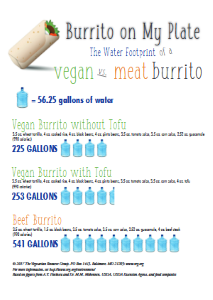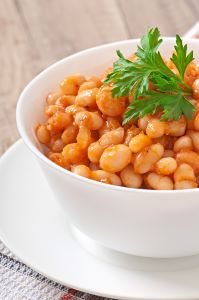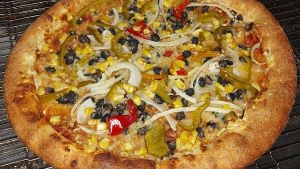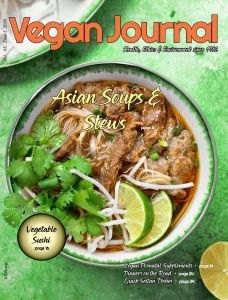Posted on
February 22, 2024 by
The VRG Blog Editor

By Jeanne Yacoubou, MS
One of the newest buzzwords in food technology is fermentation-enabled alternative proteins. In this article, we’ll break down what this term means from a vegan point of view.
What is precision fermentation?
If you recall in Part 1 of this series on precision fermentation, recombinant (transgenic) animal proteins are created by genetically engineered microbes through precision fermentation (PF). These proteins are used in “animal-free” milk, cheese, eggs, and a host of other “vegan-friendly” foods and beverages, according to the growing number of companies manufacturing them.
What are fermentation-enabled alternative proteins?
All of those bioengineered proteins – including beta-lactoglobulin, casein, ovalbumin, and lactoferrin – produced by genetically altered microbes are examples of fermentation-enabled alternative proteins (FEAP), because a type of fermentation was involved in producing them.
Organizers of the Fermentation-Enabled Alternative Protein Summit define the term fermentation-enabled alternative proteins as all proteins produced “…using microbial organisms such as yeast, algae, or fungi as a bioproduction platform. These microbes can produce…flavorings, enzymes, or other food processing ingredients. They can also produce large quantities of protein biomass which can be harnessed in the production of alternative meat and dairy products.” Basically, this means that FEAPs are alternative to traditional meat and dairy proteins from livestock.
There are three types of alternative proteins that can be produced by fermentation:
- Plant-based alternative proteins made via traditional fermentation using plant-based foods (soybeans, dairy, etc.) to make miso, tempeh, cheese, yogurt, kefir, etc.
- Biomass-based alternative proteins made via microbial biomass fermentation “…using the high protein content of microorganisms…as the main ingredient of alternative protein food products.” Mycoproteins (e.g., Quorn) and yeast extract spreads (e.g., Marmite) are two vegan examples.
- Cell-based alternative proteins made via precision fermentation using genetically engineered microbes containing recombinant genes – usually from animals. Manufacturers call them “animal-free” proteins. Because animal genes are involved in making them, it is unclear whether these FEAPs are truly vegan.
How many companies make fermentation-enabled alternative proteins?
According to a 2022 report by the Good Food Institute (GFI), the number of companies exclusively devoted to manufacturing each type of FEAP are:
- 4 using traditional fermentation
- 70 employing microbial biomass fermentation
- 62 using precision fermentation to create transgenic proteins
Besides these companies, most of which are members of the Alternative Proteins Association, they are at least 100 more with product lines featuring one or more FEAP.
Are fermentation-enabled alternative proteins sustainable?
The Good Food Institute’s 2022 report on fermentation noted the emergence of new industry partnerships intended to promote FEAP research, regulatory engagement, and consumer messaging. These are:
These new trade groups were formed to help accelerate the widespread acceptance of FEAPs as tasty substitutions to traditional meat and dairy proteins. Vegan author George Monbiot takes it a step further and believes FEAPs will eventually replace the animal agriculture industry.
Given the intensifying climate emergency, Monbiot argues in his book Regenesis that FEAPs will meet the need for sustainable food sources. In fact, FEAPs were recently bolstered by a 2022 article which concluded that a mere 20% per person substitution of microbial proteins for meat by 2050 would reduce the deforestation rate and its accompanying carbon emissions by half.
According to a 2023 study, climate and crop yield models have seriously underestimated the risks to food security caused by the climate crisis. It will be increasingly difficult to grow traditional crops for eight billion humans, let alone the more than 70 billion land animals slaughtered for food globally every year, in the coming decades.
For traditional agriculture to be successful, there must be a stable climate and adequate water at a bare minimum. Neither of these is commonplace anymore in the world.
So, if FEAPs represent the best option for human survival in the second half of this century and beyond, it’s vital to perfect FEAP fermentation technologies, make them economically and environmentally feasible, improve their palatability, and scale them up immediately.
Eating in a world where photosynthesis is far from optimal
Fossil fuel-based agriculture and its dependence on the heavy use of synthetic fertilizers and pesticides, has enabled human civilization to expand globally. Now, increasing quantities of carbon emissions produced from fossil fuel burning since the dawn of industrialization are causing global heating, intense wildfires, extreme drought, and torrential flooding in many countries.
None of these climate realities are conducive to photosynthesis, the process by which plants make food (and oxygen). So, humanity needs to develop a climate-proof agriculture or find another way to feed itself before it is too late.
One possibility is producing food in bioreactors (fermentation tanks).
Beyond Marmite and Quorn: Solein
Produced in bioreactors, yeast extracts like Marmite and mycoprotein products such as Quorn are the most popular microbial foods on the market today. Made from brewer’s yeast (Saccharomyces cerevisiae) or the mycelium of the fungus Fusarium venenatum, neither contains recombinant animal proteins.
Consisting of microbial biomass itself rather than purified proteins made by microbes via PF and used in “animal-free” foods and beverages, both yeast extracts and mycoprotein are high in protein. However, because they require a plant-based source of feedstock in their growth media, such as glucose or sucrose from corn or cane sugar, they cannot serve as the ultimate answer to humanity’s need to find a food source that is not dependent on photosynthesis either directly or indirectly.
Made by company Solar Foods, Solein is microbial biomass of a hydrogen-oxidizing bacterium, Cupriavidus necator. This microbe uses atmospheric carbon dioxide (CO2) as its carbon feedstock instead of sugar. To produce the hydrogen it also needs to make food, technologists electrolyze (split apart) water in a highly energy-intensive process. Nitrogen, phosphorus, and sulfur are also required. Solar Foods uses synthetic fertilizer to supply these elements.
Based on the Solar Foods website, Solein appears to be a vegan food product made of roughly 65% protein. The VRG attempted to confirm Solein’s vegan status with the company, but they did not respond to either our inquiry or our interview request as of January 2024.
According to the company website, C. necator has not been genetically modified. (There have been multiple genetically modified strains of C. necator developed by numerous scientists. As far as we can tell, only genes from other microbes or from plants have been used so far.) Incidentally, Monbiot refers to Solein as a product of PF, which involves transgenic engineering by definition.
Because Solein consists of fermented microbial biomass, Solein is best described as the second type of FEAP listed above: a high-protein foodstuff made by microbial biomass-based fermentation. Other sources characterize it as a single cell protein.
Like some other types of microbial biomass, Solein is initially formed in a bioreactor along with endotoxins and nucleic acids.
Daily consumption of more than 2 grams (0.1 ounce) of nucleic acids found in some types of microbial biomass may lead to high blood levels of uric acid, the major breakdown product of nucleic acids. High blood uric acid levels are associated with gout, hypertension, and other health conditions.
To further substantiate this concern, a scientific reviewer commented on numerous issues associated with microbial food manufacture in a 2021 article: “Problems related to poor digestibility, gastrointestinal diseases, skin and allergic reactions, and other, even more serious problems should be addressed in the laboratory before reaching production units.”
Nevertheless, Solein went on the market in 2023. Singapore recently granted regulatory approval to Solein and is selling it in ice cream.
In 2024, through a strategic partnership with Ajinomoto, Solar Foods will develop products made with Solein and conduct marketability studies.
Air Protein is another company using carbon dioxide to make protein. They are partnering with ADM to develop food products with their FEAP.
Whether Solein, Air Protein, and similar FEAPs made from CO2 can be sustainable foods is the subject of Part 3 of our series on precision fermentation.
The contents of this email, our website and our other publications, including Vegan Journal, are not intended to provide personal medical advice. Medical advice should be obtained from a qualified health professional. We often depend on product and ingredient information from company statements. It is impossible to be 100% sure about a statement, info can change, people have different views, and mistakes can be made. Please use your best judgment about whether a product is suitable for you. To be sure, do further research or confirmation on your own.
